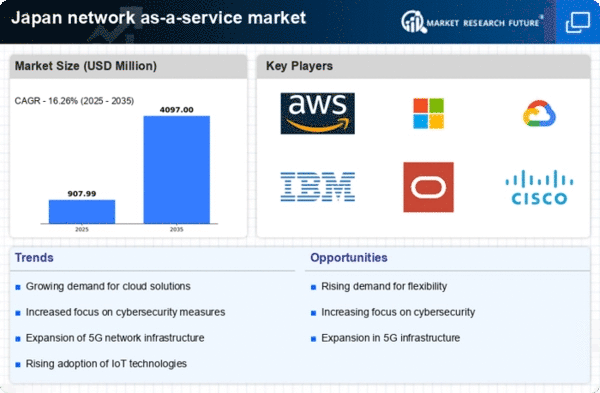Expansion of 5G Infrastructure
The expansion of 5G infrastructure is poised to have a transformative impact on the network as-a-service market in Japan. As 5G technology becomes more widely available, it is expected to enhance connectivity and enable new applications that require high-speed data transfer. This technological evolution presents significant opportunities for the network as-a-service market, as businesses seek to leverage 5G capabilities to improve their network performance. Current projections indicate that the 5G rollout in Japan could lead to a 25% increase in demand for network as-a-service solutions over the next few years. This anticipated growth highlights the potential for innovation and expansion within the market as organizations adapt to the capabilities offered by 5G.
Increased Focus on Cost Efficiency
Cost efficiency remains a critical driver for the network as-a-service market in Japan. Organizations are increasingly looking for ways to reduce their IT expenditures while maintaining high-quality network services. The subscription-based model of network as-a-service allows businesses to avoid large upfront capital investments, making it an attractive option. Recent surveys indicate that nearly 70% of Japanese companies are considering network as-a-service solutions primarily for their cost-saving potential. This focus on financial prudence is likely to propel the growth of the network as-a-service market, as more enterprises recognize the long-term savings associated with this model.
Technological Advancements in Networking
Technological advancements are playing a pivotal role in shaping the network as-a-service market in Japan. Innovations such as software-defined networking (SDN) and network function virtualization (NFV) are revolutionizing how networks are designed and managed. These technologies enable organizations to deploy and manage their networks more efficiently, reducing operational costs and enhancing performance. Recent statistics suggest that the adoption of SDN and NFV solutions in Japan has increased by over 40% in the past year. This trend underscores the potential for further growth in the network as-a-service market, as businesses leverage these advancements to streamline their networking operations and improve service delivery.
Growing Importance of Data Privacy Regulations
The network as-a-service market in Japan is significantly influenced by the growing importance of data privacy regulations. With the implementation of stringent data protection laws, businesses are compelled to adopt solutions that ensure compliance and safeguard sensitive information. The network as-a-service model offers enhanced security features that align with these regulatory requirements, making it an appealing choice for organizations. Recent reports indicate that compliance-related investments in Japan have increased by approximately 30% over the past year. This trend suggests that as companies prioritize data privacy, the network as-a-service market is likely to see increased adoption as a means to meet regulatory standards.
Rising Demand for Flexible Networking Solutions
The network as-a-service market in Japan is experiencing a notable surge in demand for flexible networking solutions. Businesses are increasingly seeking to adapt their network infrastructure to meet dynamic operational needs. This shift is driven by the necessity for scalability and agility in a rapidly evolving digital landscape. According to recent data, approximately 60% of enterprises in Japan are prioritizing flexible networking options to enhance their operational efficiency. This trend indicates a growing recognition of the importance of adaptable network solutions, which can be tailored to specific business requirements. As organizations strive to optimize their resources, the network as-a-service market is likely to benefit from this increasing demand for customizable networking capabilities.
















